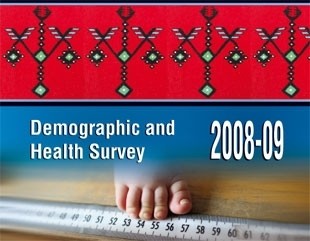
For Immediate Release
TIRANA, MARCH 15, 2010 The Ministry of Health and the National Institute of Statistics (INSTAT) released today the results of the first ever 2008-09 Albanian Demographic and Health Survey (ADHS).
This survey collected data on demographic patterns, fertility, maternal and child health, HIV, nutrition, migration and the role of women in Albania. According to the ADHS, disparities in health and nutrition status, access to health services and levels of knowledge of family planning, HIV/AIDS and STIs are identified as areas for improvement.
Key findings of the 2008-09 ADHS presented today explore the demographic and health indicator trends in Albania. According to the survey, fertility decreased and infant and child mortality declined significantly over the five years preceding the survey. Married women reported a considerable drop in the use of traditional contraceptive methods. Almost all women receive antenatal or obstetric care, and the nutritional status of children, despite an improving trend, remains a public health concern.
“Population-based studies of this magnitude are a major undertaking that provide information on important indicators which measure the progress of a country," said Dr. Petrit Vasili, Albania's Minister of Health.
The Demographic and Health Surveys (DHS) project is a global data collection effort. The 2008-09 ADHS relies on data collected from a sample of households that is representative of the whole population. The survey conducted over a period of six months from October 2008 to April 2009 interviewed 8,994 households, 7,584 women and 3,013 men age 15-49.
The survey was carried out by the Institute of Statistics (INSTAT) and the Institute of Public Health (IPH) and was funded by the U. S. Agency for International Development (USAID), the Swiss Cooperation Office (SCO- A), United Nations’ Children’s Fund (UNICEF), United Nations Population Fund (UNFPA), the World Health Organization (WHO) and the Spanish Agency for International Development Cooperation (AECID). Technical assistance to ensure quality of the survey and build local capacity was provided by ICF MACRO.
The survey provides a set of data and statistically sound estimates of social indicators which will be used by policy makers, researchers, NGOs and academia.
- DHS Full Report [PDF, 3.03MB]
- DHS Poster [PDF, 1.84MB]
- DHS Fact Sheet [PDF, 800KB]
- DHS Brochure [PDF, 3.8MB]
****
For more information please contact:
Elizana Petrela DHS coordinator IPH
Tel: 068 4058013
Lantona Sado DHS coordinator INSTAT
Tel: 069 2072884







Comment
Make a general inquiry or suggest an improvement.